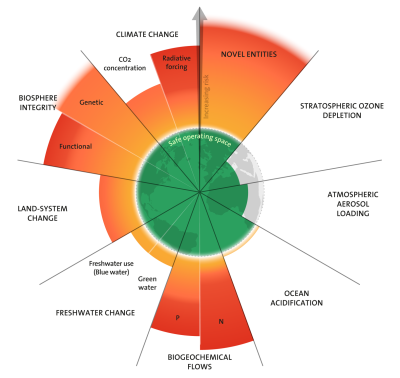First major conference on planetary boundaries by Federal Council for Sustainable Development
“Planetary boundaries, an invitation to innovate our way of thinking” is the title of the conference that the Federal Council for Sustainable Development is organizing in Brussels on 17 December 2025. This conference will combine knowledge and action on the state of our planet.

The Federal Council for Sustainable Development will bring a major conference on planetary boundaries to Belgium for the first time (image: Stockholm Resilience Centre). Scientists have identified nine processes that are essential to keeping our planet stable and livable. The planetary boundaries model indicates for each process whether the planetary systems are still healthy or whether restoration is needed. A seventh planetary boundary was recently exceeded: the acidity of ocean water. The conference will provide a scientific update: what are the implications of the disturbed planetary systems and what are the risks in Belgium?
Professor Katherine Richardson (University of Copenhagen) will open the conference with a keynote speech on the concept of planetary boundaries and what this means for our society. Katherine Richardson is a major contributor to the development of the planetary boundaries model. The importance of tipping points in planetary systems will also be explained. Once a tipping point is exceeded, it triggers accelerating and often irreversible changes.
So what does this mean for Belgium? The Belgian Climate Risk Assessment Center (CERAC, established in the wake of the 2021 flood disasters in Belgium) assesses climate and environmental risks and advises policymakers on policies and strategies to improve our country's resilience. They will present their study (2024) ‘Is Belgium living within it’s safe operating space?’. Their recommendations have already garnered media attention.
Cities in action
Making our environment more healthy and climate-resilient is a particularly great challenge, but a number of cities are already taking action and putting the principles of the “doughnut economy” into practice. In this approach, the actions are aimed at people's well-being and the restoration of planetary systems. Leonora Grcheva from the Doughnut Economics Action Lab will present inspiring case studies of cities and the solutions they implemented. A panel discussion with practical doers in Belgium will show what transitioning cities can bring to the table, with Charlotte Prové from De Stadsacademie (Ghent platform), Paul Vanderstraeten from BeDonut and David Bassens from the Brussels Centre for Urban Studies, among others.
New ideas on economie
To kick off the conference's last session, Hans Stegeman (chief economist at Triodos Bank) will give a keynote speech on what needs to change in our economic thinking in order to reverse the decline of the planet and to bring us closer to an economy that works for everyone. The lecture will be followed by a panel discussion on a new economic paradigm, featuring four prominent voices in the debate on the transition to a sustainable economy : Anne Snick (full member of The Club of Rome), Géraldine Thiry (National Bank of Belgium) and Koen Schoors (Ghent University), alongside Hans Stegeman.
The FRDO is delighted that several renowned speakers are contributing to this conference.
Professor Katherine Richardson is an expert in biological oceanography. She studies biological processes and biodiversity in relation to the carbon cycle in the upper layers of the ocean and how this affects food chains and the global carbon cycle. She is one of the main developers of the “planetary boundaries” model, which attempts to determine the extent to which specific Earth system services can be safely used by humans.
Hans Stegeman is Chief Economist and Group Director Impact & Economics at Triodos Bank, a respected columnist and author, and an important voice in the public debate on finance, sustainability and systemic change. He recently obtained a PhD on transforming the economy for sustainability.
Anne Snick (Club of Rome) is an expert in systems thinking (acknowledging interdependence and connectivity of systems). She applied this approach to our relationship with money and how we use it, the value we attach to work, and how we can define and support common goals.
Geraldine Thiry is Director of the National Bank of Belgium with special expertise in, among others, sustainable economic models and new indicators that go beyond GDP.
Koen Schoors is a professor of economics at Ghent University with a particular interest in political economy and sustainable finance, and author of the book (in dutch) ‘Alles zal anders zijn’ (“Everything will be different”), which identifies the radical changes we can and must expect for our future economy and society.
Practical information
Conference on Wednesday 17 December 2025, from 8.30 a.m. to 5 p.m. at the Royal Library (Auditorium), Mont des Arts 28, 1000 Brussels. Entrance via Boulevard de l'Empereur 2.
Languages: This conference will be mainly in Dutch and French. There will be no simultaneous translation into English.
More than 550 people have registered for the conference, which is more than the venue can accommodate. The event will therefore be streamed online.
The full programme can be found at this link.
You can still register for the live stream via: https://forms.office.com/e/7DLzUG3Y4f.
If you would like to participate as a journalist, or are interested in an interview with a speaker, please contact els.vrindts@frdo.be.
If you have any questions about the content of the conference, please contact Esther.Vandecavey@frdo.be.